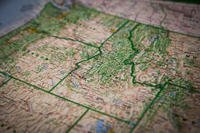One of the most difficult aspects of relocating overseas is making the financial transition. It could take weeks to settle into a budget that supports your way of life, especially if you’re accustomed to dining at fine restaurants and indulging in a shopping habit.
But with planning and research, you should have fewer surprises. And you can get more information by researching the US State Department's per diem rates and cost of living indexes.
Make the Figures Work for You
Cost of living figures provide a base idea of the salary you would need to maintain the lifestyle you are accustomed to. The figures are based on the prices of a variety of goods and services in locations throughout the world.
And what goes into that basket? Housing, health care and transportation are big ones, plus goods and services, which include food, furniture, clothing, alcohol, tobacco and entertainment.
These figures can be a precise indication of the differences in costs in places where the goods and services would be the same. But complex research is often required when you are evaluating the cost of relocating to a country with an entirely different culture, and therefore a very different basket of goods.
For example, while having a housekeeper is generally considered a luxury in the United States, it is a staple of middle-class life in Singapore.
Know the Culture, Know Yourself
Cost-of-living figures, while helpful, may require personal tailoring. Not everyone is going to consider alcohol, tobacco or a maid as necessities. And one person's definition of entertainment could include cost-free walks through the park.
Before you plan a budget, you may consider using an expense-tracking app like Mint, PocketGuard, or YNAB (You Need A Budget) to monitor your spending habits and adjust your budget accordingly.
Once you have a handle on what you typically spend at home, try to determine how your spending habits might change when you move overseas. Having a firm sense of your spending priorities and the cultural standards of where you are moving to should help you gauge how to adjust the cost of living index.
Whatever you do, make sure to establish an emergency fund in the local currency to cover unexpected expenses and provide financial stability. It’s smart to maintain a savings plan that accounts for both short-term needs and long-term goals, factoring in the currency exchange rates.
Consider the Tax Situation
There are other considerations as well. For example, most cost-of-living figures do not include taxes, They focus on spendable income, or income after taxes. For this reason, it is imperative you familiarize yourself with the tax rates before assessing your budget's feasibility.
Understand the tax obligations in your new country, including income tax rates, social security contributions, and any tax treaties between your home country and the new country. Be aware of dual taxation agreements and how they can affect your tax liability.
Cost-of-living figures can also be misleading for some expatriates because they tend to live in certain areas and usually shop at similar places for their goods and services.
How Much Would You Pay for a Big Bowl of Borscht?
Some cities, of course, are notoriously expensive, such as Tokyo, New York, London, Paris and Moscow. Housing costs in these areas are one of the main budget-busters.
According to the Economist Intelligence Unit (EIU)’s 2023 Worldwide Cost of Living Index, the world’s most expensive cities to live in are:
- Zurich, Switzerland
- Singapore
- Tel Aviv, Israel
- Copenhagen, Denmark
- New York
- Geneva, Switzerland
- Hong Kong
- Los Angeles
- Paris
- San Francisco
Regardless of where you move, be open to adjusting your lifestyle to better fit the local cost of living. This might include finding more affordable housing, shopping at local markets, and using public transportation. Embrace local customs and practices that can help you integrate and potentially save money.
US State Department Per Diem Rates
The US State Department updates its per diem rates monthly. These figures indicate the maximum supplementary stipends allotted to service people and their families in countries throughout the world and can give you a sense of the comparative costs of living.
Salary Calculator
You can estimate the salary you might need in your expat city by first seeing what income is considered necessary to stay whole at home. Use a salary calculator to research US cities. Research needed salaries in expensive U.S. cities like New York or San Francisco, for example, if London or Paris are your possible destinations.
Additionally, websites like Numbeo and Expatistan can provide useful insights into average costs for various expenses.
Staying Whole
When calculating cost-of-living allowances, a company will want to keep the employee whole, meaning they will preserve the employee's lifestyle with respect to housing, goods and services, and transportation.
An international assignment shouldn't be a windfall for an employee, but it shouldn't be an expense, either.
When you relocate overseas, it's difficult to think in the right currency while trying to work out a viable budget. Often, individuals and corporations planning international relocation don't overlook details like the particular expenses they will incur, but rather they neglect the larger picture.
By combining the strategies listed above, you can better manage your finances and ensure a smooth transition to living in a new country, mitigating the challenges associated with currency conversion and cost-of-living differences.













